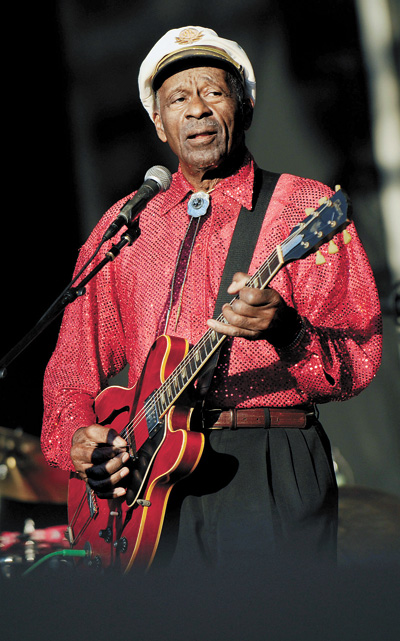
CHUCK BERRY, rock ’n’ roll’s founding guitar hero and storyteller who defined the music’s joy and rebellion in such classics as “Johnny B. Goode,” “Sweet Little Sixteen” and “Roll Over Beethoven,” died Saturday at his home west of St. Louis. He was 90. Emergency responders summoned to Berry’s residence by his caretaker about 12:40 p.m. found him unresponsive, police in Missouri’s St. Charles County said in a statement. Attempts to revive Berry failed, and he was pronounced dead shortly before 1:30 p.m., police said. Berry’s core repertoire was some three dozen songs, his influence incalculable, from the Beatles and the Rolling Stones to virtually any group from garage band to arena act that called itself rock ’n’ roll. “Just let me hear some of that rock ’n’ roll music any old way you use it I am playing I’m talking about you. God bless Chuck Berry Chuck,” Beatles drummer Ringo Starr tweeted, quoting some lyrics from a Berry hit. While Elvis Presley gave rock its libidinous, hip-shaking image, Berry was the auteur, setting the template for a new sound and way of life. “Chuck Berry was a rock and roll original. A gifted guitar player, an amazing live performer, and a skilled songwriter whose music and lyrics captured the essence of 1950s teenage life,” the Rock & Roll Hall of Fame said in a statement. Well before the rise of Bob Dylan, Berry wedded social commentary to the beat and rush of popular music. “He was singing good lyrics, and intelligent lyrics, in the ’50s when people were singing, ‘Oh, baby, I love you so,’” John Lennon once observed. Berry, in his late 20s before his first major hit, crafted lyrics that spoke to the teenagers of the day and remained fresh decades later. “Sweet Little Sixteen” captured rock ’n’ roll fandom, an early and innocent ode to the young girls later known as “groupies.” “Roll Over Beethoven” was an anthem to rock’s history-making power, while “Rock and Roll Music” was a guidebook for all bands that followed. “Back in the U.S.A.” was a black man’s straight-faced tribute to his country at a time there was no guarantee Berry would be served at the drive-ins and corner cafes he was celebrating. “Everything I wrote about wasn’t about me, but about the people listening,” he once said. “Johnny B. Goode,” the tale of a guitar-playing country boy whose mother tells him he’ll be a star, was Berry’s signature song, the archetypal narrative for would-be rockers and among the most ecstatic recordings in the music’s history. “Chances are you have talent,” Berry later wrote of the song. “But will the name and the light come to you? No! You have to go!” When NASA launched the unmanned Voyager I in 1977, an album was stored on the craft that would explain music on Earth to extraterrestrials. The one rock song included was “Johnny B. Goode.” Charles Edward Anderson Berry was born in St. Louis on Oct. 18, 1926. A fan of blues, swing and boogie woogie, Berry studied the very mechanics of music and how it was transmitted. As a teenager, he loved to take radios apart and put them back together. Using a Nick Manoloff guitar chord book, he learned how to play the hits of the time. He began his musical career at 15 when he went on stage at a high school review to do his own version of Jay McShann’s “Confessin’ the Blues.” Berry would never forget the ovation he received. Meanwhile, his troubles with the law began, in 1944, when a joy riding trip to Kansas City turned into a crime spree involving armed robberies and car theft. Berry served three years of a 10-year sentence at a reformatory. In 2000, Johnnie Johnson, the boogie-woogie piano master who collaborated on many Berry hits, sued Berry over royalties and credit he believed he was due for the songs they composed together over more than 20 years of collaboration. The lawsuit was dismissed two years later. Berry’s career nearly ended decades earlier, when he was indicted for violating the Mann Act, which barred transportation of a minor across state lines for “immoral purposes.” An all-white jury found him guilty in 1960, but the charges were vacated after the judge made racist comments. A trial in 1961 led to his serving 1 1/2 years of a three-year term. Tax charges came in 1979, and another three-year prison sentence, all but 120 days of which was suspended. Some former female employees later sued him for allegedly videotaping them in the bathroom of his restaurant. The cases were settled in 1994, after Berry paid US$1.3 million. (SD-Agencies) Berry’s Billboard highlights “Maybellene” (1955) “Thirty Days (To Come Back Home)” (1956) “Roll Over Beethoven” (1956) “Brown Eyed Handsome Man” (1957) “School Day” (1957) “Rock & Roll Music” (1958) “Sweet Little Sixteen” (1958) “Johnny B. Goode” (1958) “Carol” (1959) “Almost Grown” (1959) “Back in the U.S.A.” (1964) “Nadine (Is It You?)” (1964) “No Particular Place to Go” (1964) “You Can Never Tell” (1964) “My Ding-A-Ling” (1972) | 
